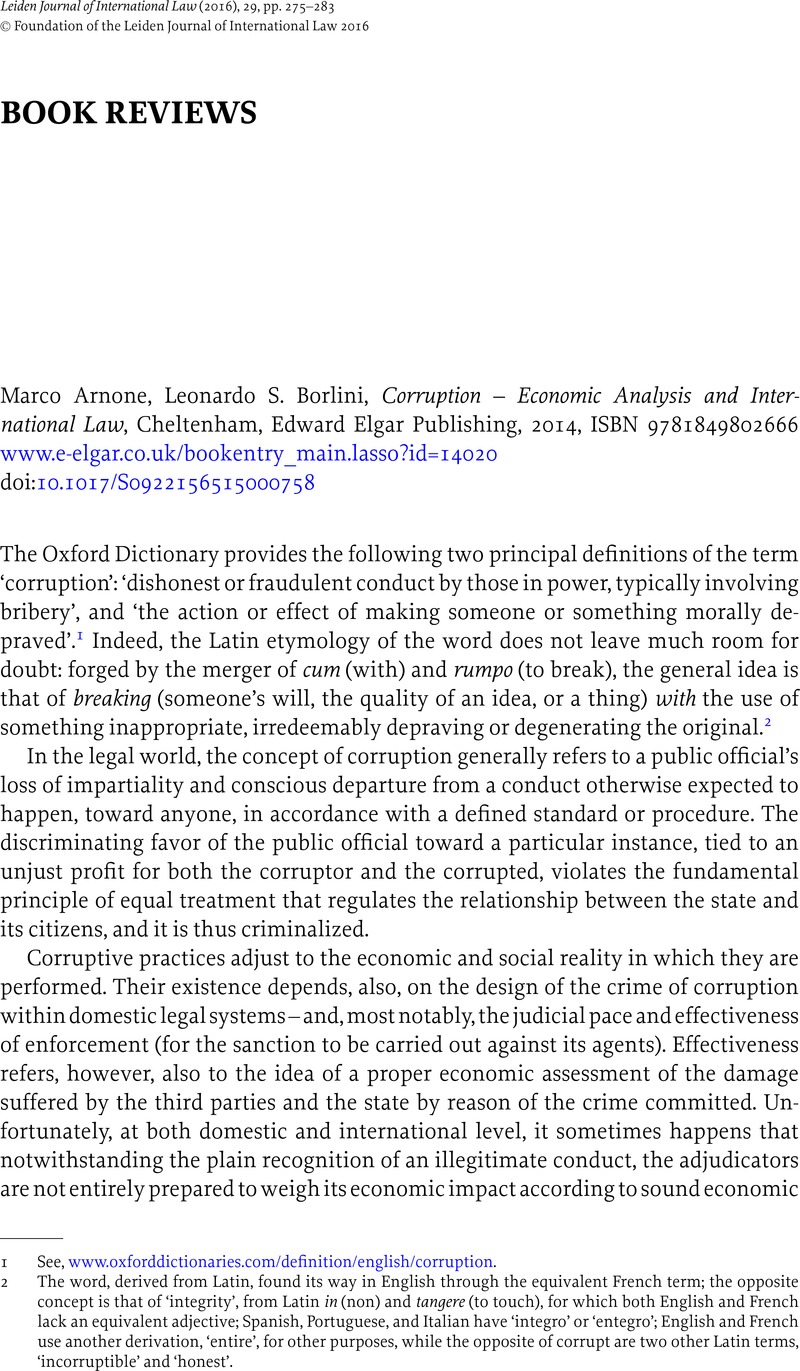No CrossRef data available.
Article contents
Marco Arnone, Leonardo S. Borlini, Corruption – Economic Analysis and International Law, Cheltenham, Edward Elgar Publishing, 2014, ISBN 9781849802666www.e-elgar.co.uk/bookentry_main.lasso?id=14020
Published online by Cambridge University Press: 01 February 2016
Abstract

- Type
- BOOK REVIEWS
- Information
- Copyright
- Copyright © Foundation of the Leiden Journal of International Law 2016
References
2 The word, derived from Latin, found its way in English through the equivalent French term; the opposite concept is that of ‘integrity’, from Latin in (non) and tangere (to touch), for which both English and French lack an equivalent adjective; Spanish, Portuguese, and Italian have ‘integro’ or ‘entegro’; English and French use another derivation, ‘entire’, for other purposes, while the opposite of corrupt are two other Latin terms, ‘incorruptible’ and ‘honest’.
3 Cf., the difference between what was claimed (US$11.5 million) and what was awarded (US$95.000) by the International Court of Justice to Mr. Diallo, for which Guinea exercized diplomatic protection against Congo in the Case Concerning Ahmadou Sadio Diallo (Republic of Guinea v. Democratic Republic of the Congo), Compensation owed by the Democratic Republic of the Congo to the Republic of Guinea, Judgment of 19 June 2012, [2012] ICJ Rep. 324. More specifically, the Court awarded US$85.000 for ‘non-material injury’ as ‘established even without specific evidence’ and ‘rest on equitable considerations’; US$10.000 was instead awarded for Mr. Diallo's loss of personal property, based on ‘equitable considerations’ rather than specific evidence; striking is the Court's consideration that ‘Mr. Diallo lived and worked in the territory of the DRC for over thirty years, during which time he surely accumulated personal property’. For a general assessment of the economic assessments of international court and tribunal, see Pauwelyn, J., Use, Non-use and Abuse of Economics in WTO and Investor-State Dispute Settlement, in Huerta-Goldman, J., Romanetti, A. and Stirnimann, F. (eds.), WTO Litigation, Investment and Commercial Arbitration – Cross-fertilization and Reciprocal Opportunities (2013)Google Scholar.
4 Marco Arnone (1968–2012), Ph.D. (Pavia) and MSc (Warwick) in Economics. Dr. Arnone was the Director of the Centre for Macroeconomics and Finance Research (CEMAFIR) of Milan, Italy. IMF economist at the Monetary and Financial System department, and at the African department.
5 Leonardo Borlini, Ph.D. (Bocconi), LL.M. (Cantab.), BA in Economics (Bocconi). Assistant Professor of International and EU Law and Research Fellow at the Baffi Center on International Markets, Money and Regulation at Bocconi University (Milan, Italy); former member of the Italian delegation for the OECD Working Group on Bribery. Consultant for the IMF, the World Bank, and the Italian Competition Authority.
6 P. 381.
7 P. 308.
8 World Duty Free Company Limited v. Republic of Kenya, ICSID Case No. ARB/00/7, Award, Oct. 4th, 2006, paras. 130 ff.; see also Inceysa Vallisoletana S.L. v. Republic of El Salvador, ICSID Case No. ARB/03/26, Award, Aug. 2nd, 2006, paras. 190–252. Both awards, nevertheless, have not escaped criticism: by elevating corruption as a ‘general principle’ and by making reference to specific -yet different- instances of other general principles, they failed to identify clear boundaries as to its extent. For a critical perspective of the Tribunals’ reasoning, see, e.g., A. Kulick, Global Public Interest in International Investment Law (2012), 322–4.
9 P. 436.
10 P. 310.
11 P. 525.
12 Ibid.


